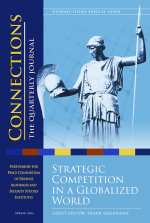Strategic competition has significantly reframed American strategic thought, particularly its national security and military strategies, by defining the threats to American primacy and the rules-based international order posed mainly by China and Russia. However, the term "strategic competition" is not universally understood within the U.S. government, leading to varying perspectives on how to proceed. Additionally, it does not adequately address how competitors approach international competition, creating a risk of miscalculation and an increased chance of conflict. Finally, for the United States, strategic competition establishes a framework that perpetuates challenges for American strategy and the use of elements of national power. While "strategic competition" is necessary to focus and drive American strategy and strategic calculus, it is also a vague and imperfect construct that could lead decision-makers down consequential paths.
Reviewed article
Strategic Competition and U.S. National Strategies
Article statistics
Bibliography
“Great Power Competition: Implications for Defense – Issues for Congress,” CRS Report R43838 (Washington, DC: Congressional Research Service, May 16, 2023), https://crsreports.congress.gov/product/pdf/R/R43838/95.
“Joint Concept for Competing,” Joint Chiefs of Staff, February 10, 2023, https://s3.documentcloud.org/documents/23698400/20230213-joint-concept-for-competing-signed.pdf.
“Pentagon’s Joint Concept for Competing,” U.S. Naval Institute, March 9, 2023, https://news.usni.org/2023/03/09/pentagons-joint-concept-for-competing.
Allison, Graham, Destined for War: Can America and China Escape Thucydides’s Trap? (Boston: Houghton Mifflin Harcourt, 2017).
Biden, Joseph R., National Security Strategy (Washington, DC: White House, October 2022), https://www.whitehouse.gov/wp-content/uploads/2022/10/Biden-Harris-Administrations-National-Security-Strategy-10.2022.pdf.
Boroff, Alexander, “What Is Great-Power Competition, Anyway?” Modern War Institute at West Point, April 17, 2020, https://mwi.westpoint.edu/great-power-competition-anyway/.
Brands, Hal, The Twilight Struggle: What the Cold War Teaches Us About Great-Power Rivalry Today (New Haven and London: Yale University Press, 2022).
Campbell, Kurt M., and Ely Ratner, “The China Reckoning: How Beijing Defied American Expectations,” Foreign Affairs, February 13, 2018, https://www.foreignaffairs.com/articles/china/2018-02-13/china-reckoning.
Fukuyama, Francis, The End of History and the Last Man (New York, NY: Maxwell Macmillan, 1992).
Kagan, Donald, On the Origins of War and the Preservation of Peace, 1st ed. (New York, NY: Doubleday, 1995).
Lebow, Richard Ned, “Reason, Cause, and Cultural Arrogance,” E-International Relations, April 11, 2023, https://www.e-ir.info/2023/04/11/reason-cause-and-cultural-arrogance/.
Obama, Barack, National Security Strategy (Washington, DC: White House, February 2015), https://obamawhitehouse.archives.gov/sites/default/files/docs/2015_national_security_strategy_2.pdf.
Overfield, Cornell, “Biden’s ‘Strategic Competition’ Is a Step Back,” Foreign Policy, October 13, 2021, https://foreignpolicy.com/2021/10/13/biden-strategic-competition-national-defense-strategy/.
Pomerleau, Mark, “Pentagon Publishes New ‘Joint Concept for Competing,’ Warning That Adversaries Aim to ‘Win Without Fighting’,” DefenseScoop, March 7, 2023, https://defensescoop.com/2023/03/07/pentagon-publishes-new-joint-concept-for-competing-warning-that-adversaries-aim-to-win-without-fighting/.
Preble, Christopher, “A Credible Grand Strategy: The Urgent Need to Set Priorities,” Stimson Report (Washington, D.C.: The Stimson Center, January 2024), https://www.stimson.org/wp-content/uploads/2024/01/Grand-Strategy-Report-WEB.pdf.
Raimondo, Gina, “Innovation, Equity, and Resilience: Strengthening American Competitiveness in the 21st Century,” U.S. Department of Commerce Strategic Plan 2022-2026 (Washington, D.C.: U.S. Department of Commerce, 2022), https://www.commerce.gov/sites/default/files/2022-03/DOC-Strategic-Plan-2022%E2%80%932026.pdf.
Thucydides, Robert B. Strassler, and Richard Crawley, The Landmark Thucydides: A Comprehensive Guide to the Peloponnesian War, 1st Touchstone ed. (New York, NY: Simon & Schuster, 1998).
Trump, Donald, National Security Strategy of the United States of America (Washington, DC: White House, December 2017), 26, https://trumpwhitehouse.archives.gov/wp-content/uploads/2017/12/NSS-Final-12-18-2017-0905.pdf.
Wertheim, Stephen, “Why America Can’t Have It All: Washington Must Choose Between Primacy and Prioritizing,” Foreign Affairs, February 14, 2024, https://www.foreignaffairs.com/united-states/why-america-cant-have-it-all.
Winkler, Stephanie Christine, “Strategic Competition and US-China Relations: A Conceptual Analysis,” The Chinese Journal of International Politics 16, no. 3 (Autumn 2023): 333-356, https://doi.org/10.1093/cjip/poad008.

